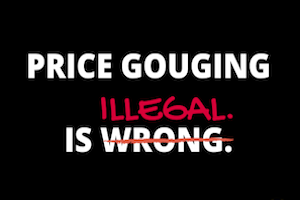
The issue of inflation, along with a pandemic that won’t quit, right-wing political extremism, and anxiety about the ongoing war in Ukraine, are among the top concerns for many Americans. But the current rise of inflation, the biggest increase in prices in about 40 years, climbing to 8.3 percent in April, is uppermost on most American’s minds.
Surging energy and food prices, spiking inflation around the world, are linked to Vladimir Putin’s invasion of Ukraine and subsequent sanctions imposed on Russian oil and wheat. But there’s a growing body of evidence that indicates many corporations are exploiting the rise of pandemic-linked inflation to maximize profits at the expense of working families and small business.
Between The Lines’ Scott Harris spoke with Mike Mitchell, Groundwork Collaborative’s director of policy and research. Here, he discusses his group’s research that reveals corporate America is taking advantage of the pandemic to cash in, and why he believes Congress should impose a windfall profits tax to rein in corporate profiteering that has yielded the highest profit margins in 70 years.
MIKE MITCHELL: One of the things that we’ve been paying a lot of attention to for the past few months is inflation and trying to understand the role that corporate concentration — that is, the more and more power that corporations have day to day, the role that it has in raising prices and making it harder for families to make ends meet. And what we’re seeing today is that not only are corporations responsible for a large share of inflation in this current large share of rising prices, they’re bragging about it.
You can go into earnings calls at any given time over the course of the year. And on these earnings calls, CEOs, CFOs, they have to be honest. They can’t lie to their investors. And they are actively boasting about how they’re able to raise prices well above costs, increase costs they’re seeing and consumers are footing the bill.
And so we think that it’s really important to to lift this message up and make sure that individuals across the country, lawmakers understand what’s happening and act accordingly.
SCOTT HARRIS: Provide our listeners with some examples of some of these companies. And I know there’s a list of them, including 3M corporation, Kimberly-Clark, MasterCard and Visa. But maybe talk about some of the representative examples of these corporations and the price hikes that they’re invoking that really have nothing to do with their increased costs.
MIKE MITCHELL: Absolutely. So as I mentioned earlier, you can log on to any of these earnings calls at any given time and you’ll hear CEOs just absolutely bragging. And they’re saying this in plain English. The CEO of the grocery giant Kroger told investors a few months ago, a little bit of inflation is always good in our business. And then, of course, right after that, they announced a range of price hikes.
Hostess’ CEO in March of this year, said we’re seeing consumers experiencing a lot of disruptions. It’s a large range of variability as we seen throughout the year. As they flow throughout the year, they’re losing benefits. They’re moving to a normalized COVID environment. They haven’t fully recognized that they’re absorbing pricing. That’s that’s their CEO saying that, you know, the day-to-day tumult that that consumers are going through is a distraction from the fact that they’re paying more when they go to the grocery store.
You can look at home essentials like diapers or cleaning products. You can go into oil and gas or auto industry and you’ll see CEOs talking about the ability that they have in this moment to raise prices with with little pushback. And they can because in many of these industries, they have huge, huge market power. There is no alternative for consumers and that has huge consequences.
And it means that ultimately, consumers are left footing the bill.
SCOTT HARRIS: What can Congress do in terms of reining in these exploitive price increases amidst inflation? There is something called a windfall profits tax, and there’s historic precedent for levying such taxes on big corporations that are engaged in price gouging.
MIKE MITCHELL: That’s absolutely right. And, you know, in times of emergency or in times of war, we’ve had, you know, war profiteering rules in place. States all across the country have laws on the books around price gouging and profiteering. This is not something that’s a real foreign idea or something that’s unheard of and is actually fairly commonplace. But in terms of an excess profits tax, you know, that’s one strategy that looks to ensure that in moments of emergency, large corporations can’t take advantage of consumers by raising their prices to an unreasonable level.
It also serves as a really significant disincentive to raise prices and ensures that any of those excess profits that corporations are seeing as a result of some of these practices goes back into the kinds of investments that we know help families into the investments that ultimately strengthen our infrastructure, which we’ve seen has been fairly brittle during this pandemic.
So, you know, an excess profits tax going after large corporations and looking to break them up via antitrust policies, looking to make sure that ocean shipping has the appropriate reforms. There’s been recent actions on that side — are all really important things to to make sure that, you know, corporations are behaving, make sure that they don’t get too big, and then make sure that we have the infrastructure robust enough to handle demand.
Listen to Scott Harris’ in-depth interview with Mike Mitchell (14:23) and see more articles and opinion pieces in the Related Links section of this page.
For more information visit Groundwork Collaborative at groundworkcollaborative.org.




